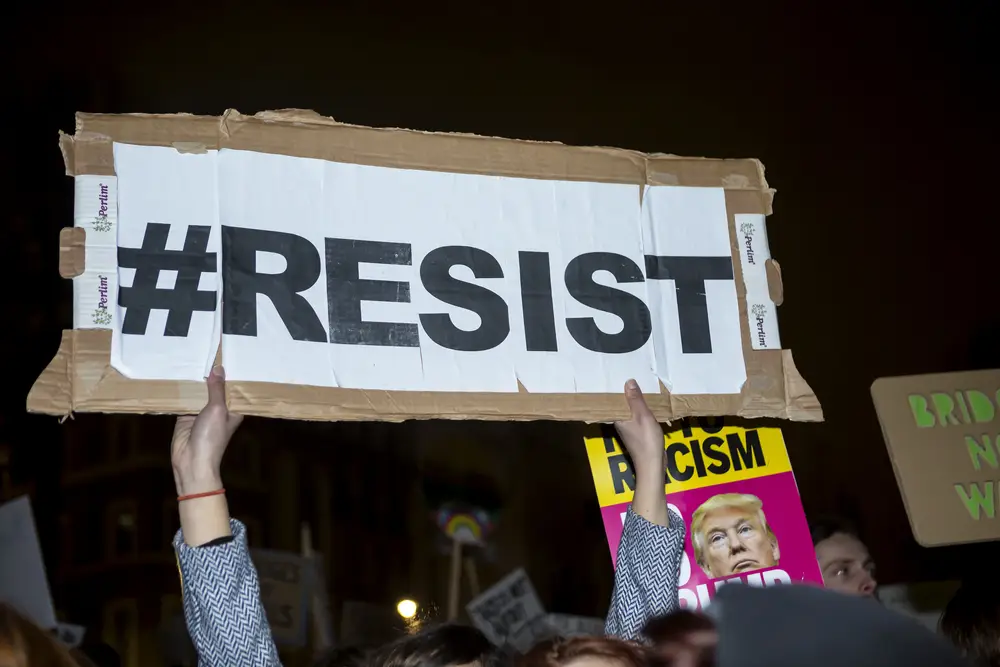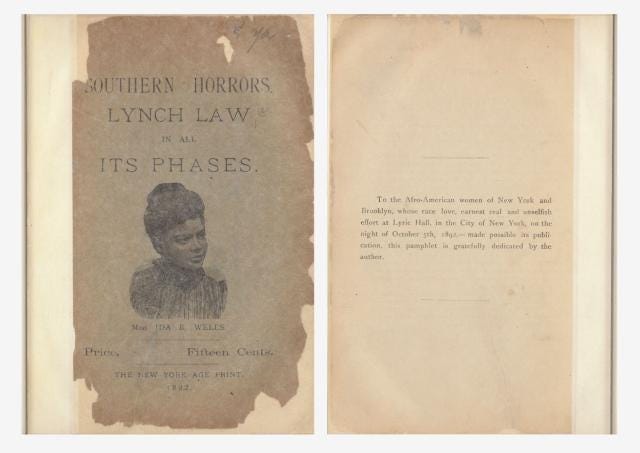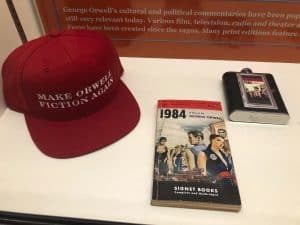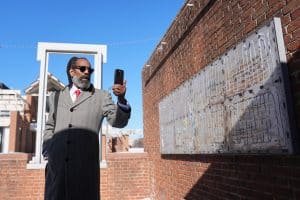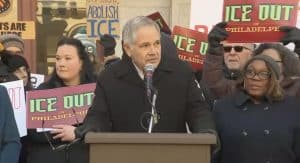Over the last week, the Nazi-salute-throwing contingent of the Trump regime has dramatically accelerated its attacks on democratic institutions. In a brazen disregard of existing laws and public welfare, Musk and his saboteurs have orchestrated a stunning bureaucratic coup, taking over the payment, personnel, and management systems of the federal bureaucracy. While these fascists decry the federal bureaucracy as “illegal,” with Musk framing his liquidation of USAID as removing “a viper’s nest of radical-left marxists who hate America,” what it amounts to is an attack by the world’s richest men on its poorest people.
These incursions into our public resources, which undercut the remaining social protections afforded by the federal government, align directly with the initiatives of Project 2025 and white conservatives’ longstanding goal of (re)creating the Christian nationalist Jim Crow apartheid state. Despite the language of illegality deployed by Trump, his surrogates, and the man who bought a president to justify the destruction of our public institutions, the job of the federal bureaucracy, in fact, is to establish, maintain, and support our collective rights. Destroying it, as these fascist interlopers are now doing, is designed to negate the (frankly insufficient) existing protections previously supported by the federal government. These have ensured cleaner food, safer workplaces, and fairer treatment by bosses and cops. We ought to be making these protections stronger and using them to build more robust and vibrant communities. Instead, members of the predator class have captured and are in the process of destroying them.
Much of the discussion and reporting around this tactic of fascist acceleration revolves around whether or to what extent these actions are “illegal.” While I think the answer is fairly obvious—Musk’s bureaucratic coup is certainly against the law—I want to suggest that it is not, in fact, illegal. I realize at face value that this seems a contradictory and counterproductive claim, but what we can already see is that those in power have acquiesced and aided in the liquidation of the public bureaucratic infrastructure of our shared rights. What I’m suggesting here—which I mean as a critique—is that something cannot be illegal if those in power carry it out with impunity, regardless of whether or not it is against the law. In other words, the question of whether or not these acts of fascist acceleration are legal obstructs where we ought to focus—on elite capture of the legal and of the underlying language and mechanisms for adjudicating our ostensibly shared rights.
My thinking on this point grows out of The Racial Contract by Charles Mills and other works critical of the racist ways that those in power have historically applied and administered laws in the U.S. Scholars, lawyers, and activists generally refer to this body of work as Critical Race Theory—a set of ideas criticizing white supremacist renderings of our collective laws and resources. For some mysterious reason, white conservatives have tried to destroy CRT, which helps us understand these attacks on democracy, at the very moment they orchestrated a series of coups designed to liquidate the resources and legal protections tied to the federal bureaucracy. How odd!
Although I’m very interested in the theory, I think it might be most useful to look at a few examples where what was clearly against the law did not qualify as illegal. These instances point to larger patterns of elites leveraging wealth and white supremacy in their lawless interpretation and application of the law.
I think if we’re reflective and honest with ourselves, most of us would admit that we’ve seen versions of this in our everyday lives. Perhaps we’ve explained these instances away as “contradictions,” or deployed the language of “hypocrisy” to vindicate the larger system. But what I want to suggest here is in fact that there’s something more sinister at work preventing what we might call the equality of “the rule of law” in favor of the “law and order” of the predator class and their enslaver forebears. It has become increasingly clear that, in the words of Huey Newton, this group constitutes an enemy of democracy whose “whole existence is a mistake, and we suffer from it.”
READ: Dan Berger’s ‘Stayed on Freedom’ Shows Why It’s Important to Fight Racism and Voter Suppression
The enslavement of Asylum Peters provides a compelling window into the distinction between that which is against the law and what counts as illegal. As my friend, historian Cory James Young, argues in “Finding Asylum: Slavery, Freedom, and Legacy in Northern Pennsylvania,” despite his role as one of the few enslaved people to settle the Pennsylvania wilderness, Peters could never have been legally enslaved. His mother was trafficked from the Black abolitionist revolution in Haiti to Pennsylvania, and “technically was free the moment she stepped off the boat in Philadelphia… Under Pennsylvania law, [Asylum] Peters was born free.” Yet despite the clarity of the law on this point, both Peters and his mother were held in bondage by enslavers and officials who refused to implement the law in ways that limited their own power.
Similar to the “massive resistance,” “redistricting,” “segregation academies,” and anti-bussing riots employed by white Americans to prevent desegregated schools, white Pennsylvanians often applied the law to their own advantage during the age of gradual emancipation. Thus, Young writes, Peters “was bought and sold, separated from his parents, made to work, and denied an education.” His enslavement was against the law, but as we can see was in no way illegal. Those in power made sure of it. “As the saying goes,” Young concludes, “rights without remedies are no rights at all.”
After emancipation, white Southerners used vigilante and state violence to suppress Black rights. They passed a series Black Codes designed to recreate the conditions of slavery. These included bans on Black social and religious activities, forbade seeking new employers, prohibited Black gun ownership, and forced Black Southerners to carry a pass from a white employer if they left their workplaces. In short, they resurrected the old slave codes. Cops regularly arrested Black workers as “vagrants” and leased them out to “employers” on an annual basis. Thus while slavery was against the law, it was not illegal. Former enslavers in the courts and state legislatures made sure of it.
In the decades after emancipation, white Americans further developed this system, using the threat of lynching and mass violence to steal Black wages and resources while suppressing Black rights. As Ida B. Wells explained in Southern Horrors, Black owners of “a flourishing grocery business in a thickly populated suburb of Memphis” made themselves a target by virtue of their success. The proprietors—Thomas Moss, Calvin McDowell, and William “Henry” Stewart—after defending themselves against a nighttime raid by “a posse of officers, twelve in number, who afterward claimed to be hunting a man for whom they had a warrant,” were arrested and then lynched on March 9, 1892 by a mob of white Memphians. For publishing that the real motive for the lynching was to eliminate a Black business, Wells reported that her paper was raided by a white mob. “The owners were ordered not to return,” she wrote, and “the Free Speech was suspended with as little compunction as the business of the ‘People’s Grocery’ broken up and the proprietors murdered.” While it wasn’t against the law for Black Memphians to run a successful grocery store or operate a newspaper, it was illegal. White businessmen made sure of it.
Indignant, Wells wrote Southern Horrors to expose the disparity between the letter and practice of the law. That dynamic has been a defining feature of white conservatism since forever. “The mockery of law and justice which disarmed men and locked them up in jails where they could be easily and safely reached by the mob” she observed, led “Afro-American ministers, newspapers and leaders counselled obedience to the law which did not protect them.” As Wells understood, deferring to authority could only lead to plunder, privation, and murder.
Again, it is no accident that white conservatives have attacked our ways of identifying and criticizing injustice as part of their project to expand inequality. Nor are these attacks illegal. Fascist accelerationists and their allies made sure of it.
Understanding this lawless ideological and material system and how it functions is the first step towards defeating it. In that vein, I want to end with a passage from Newton’s letter to the National Liberation Front of South Vietnam. “We recognize that our common enemy is the American imperialist,” he wrote, “who is the leader of international bourgeois domination. There is not one fascist or reactionary government in the world today that could stand without the support of United States imperialism.” White businessmen and their conservative proxies made sure of it.
This article was originally published at In Case of Emergency newsletter and is reprinted here with permission.
